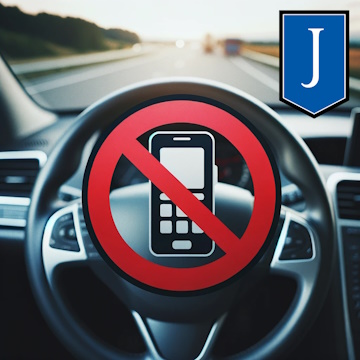What is a Textalyzer and How Could It Impact Distracted Driving?
Distracted driving continues to be a leading cause of car accidents and fatalities. In recent years, one proposed solution to combat this issue has been the introduction of a device known as a Textalyzer. Here’s what you need to know about this innovative yet controversial tool.
Quick Links

What is a Textalyzer?
A Textalyzer is a device designed to analyze a driver’s phone for signs of activity during or just before a car accident. Similar to how a breathalyzer tests for alcohol consumption, a Textalyzer can determine whether a driver was using their phone, either hands-on or hands-free, at the time of an accident.
How Does the Textalyzer Work?
The Textalyzer connects to a driver's phone and scans for recent activity such as texting, app usage, or phone calls. The goal is to provide law enforcement with a quick and efficient way to determine if distracted driving was a factor in an accident without accessing the phone's personal data.
Potential Benefits of the Textalyzer
- Enhanced Safety: By discouraging phone use while driving, the Textalyzer could help reduce the number of distracted driving incidents.
- Quicker Investigations: It would allow police to quickly assess whether a driver was distracted, speeding up accident investigations.
- Deterrent Effect: Knowing that their phone use could be checked, drivers might be less likely to use their phones behind the wheel.
Examples of Attempted Textalyzer Laws
- New York: In 2017, New York considered a bill known as Evan's Law, named after 19-year-old Evan Lieberman, who was killed in a car accident caused by distracted driving. This proposed legislation would have authorized the use of Textalyzers by law enforcement to determine if a driver was using their phone at the time of an accident. However, the bill faced significant privacy concerns and has not been passed into law.
- New Jersey: Similar to New York, New Jersey legislators proposed a bill in 2017 that would allow police to use Textalyzers to determine if distracted driving played a role in car accidents. The bill also faced pushback over privacy issues and has not been enacted.
- Tennessee: In 2019, Tennessee introduced a bill to explore the use of Textalyzers. The proposed legislation aimed to reduce distracted driving incidents but encountered similar privacy concerns and has not moved forward.
Critical Insights: Privacy Concerns and Ethical Dilemmas
Despite its potential benefits, the Textalyzer has faced significant opposition, primarily due to privacy concerns:
- Access to Personal Data: Critics argue that the Textalyzer could inadvertently access personal information, leading to privacy violations. Even if designed to avoid content inspection, the potential for misuse remains a concern.
- Legal and Ethical Issues: The legality of accessing someone's phone without a warrant is a contentious issue. Opponents believe it infringes on constitutional rights. The Fourth Amendment protects against unreasonable searches and seizures, and accessing phone data without consent could be seen as a violation.
- Implementation Challenges: Determining how to implement the use of Textalyzers while protecting individuals' privacy rights remains a major hurdle. Ensuring that the technology is used strictly within legal boundaries requires robust oversight and clear regulations.
Other Measures to Combat Distracted Driving
While the Textalyzer remains a controversial solution, there are several other effective measures to combat distracted driving:
- Public Awareness Campaigns: Educating the public about the dangers of distracted driving through media campaigns and community programs can change behaviors and attitudes.
- Stricter Penalties: Implementing harsher penalties for those caught using their phones while driving can serve as a deterrent. For instance, increasing fines, adding points to licenses, and mandatory driving courses.
- Technology Solutions: Encouraging the use of hands-free devices and apps that disable phone functions while driving can minimize distractions. Some apps can automatically send responses indicating the driver is unavailable.
- Enhanced Law Enforcement: Increasing the number of officers on the road to monitor and deter distracted driving. Regular enforcement campaigns can also increase awareness and compliance.
Evaluating the Effectiveness of Distracted Driving Laws
- Data-Driven Approaches: Regularly analyzing accident data to evaluate the effectiveness of distracted driving laws and adjusting strategies accordingly.
- Collaboration with Technology Companies: Partnering with smartphone manufacturers and app developers to create and promote safer driving technologies.
Why It Matters
Understanding the potential impact of tools like the Textalyzer is crucial as society seeks ways to enhance road safety. While the device holds promise, its implementation must be carefully considered to balance safety benefits with privacy rights. As personal injury attorneys, we are committed to staying informed about new developments that could affect drivers and accident victims alike.
Stay Informed and Stay Safe
While the future of the Textalyzer remains uncertain, one thing is clear: distracted driving is a serious issue that requires our attention. If you or a loved one has been injured in a distracted driving accident, our experienced attorneys are here to help. Contact us today for a free, initial consultation and learn how we can assist you in getting the compensation you deserve.

